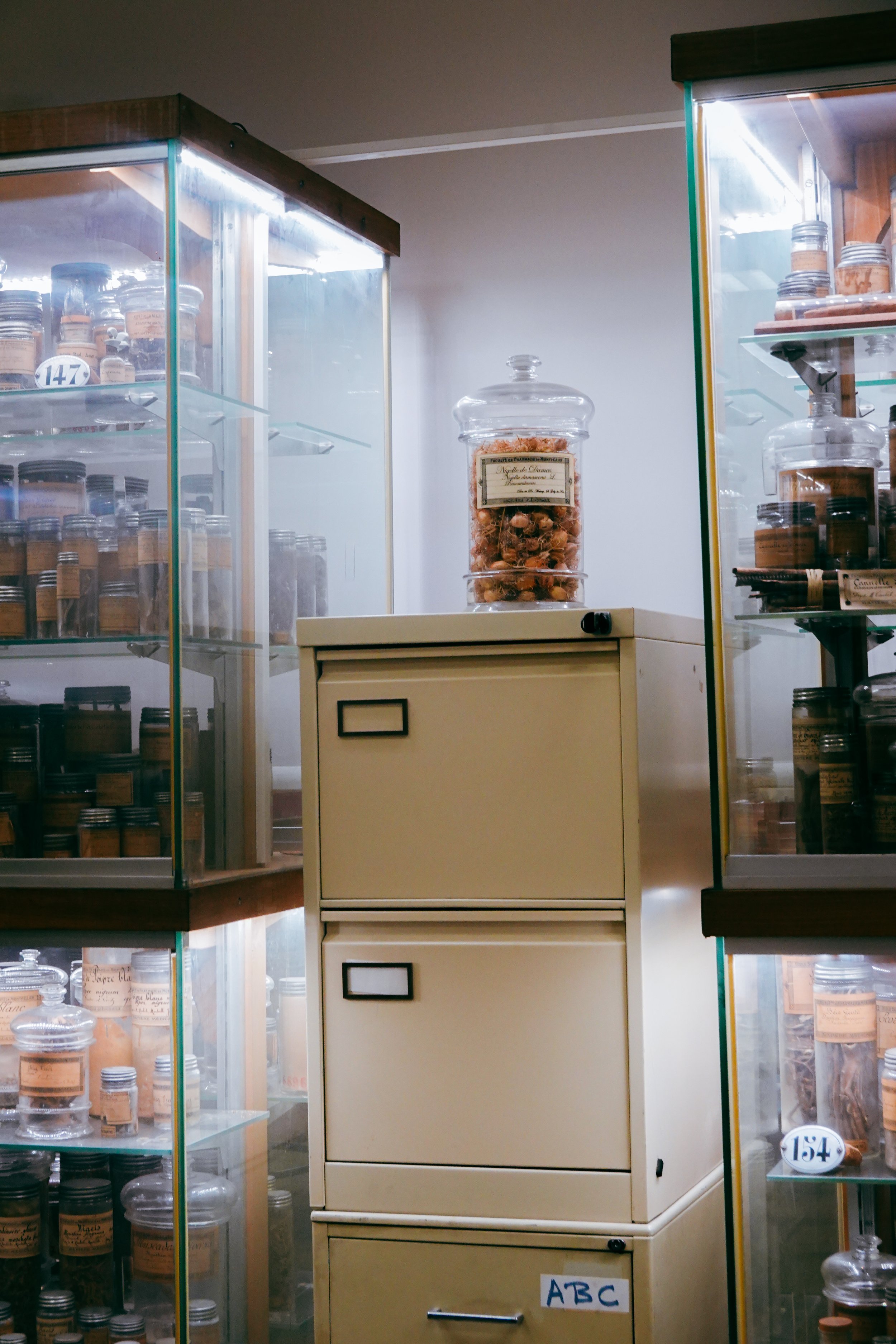Droguier Revisited. Untold stories behind Montpellier’s unique herbarium
Herbaria serve as critical repositories of plant biodiversity, providing an irreplaceable scientific record essential for understanding past ecosystems and addressing the pressing challenges of conservation, climate adaptation, and sustainable development. Beyond their ecological significance, herbaria offer an invaluable yet relatively underutilised resource for material sciences and design, acting as rich archives of natural structures, compounds, and processes that inspire sustainable innovations in textiles, biomaterials, and regenerative design.
Housed within the Faculty of Pharmacy at the University of Montpellier, the herbarium—or Droguier, as it is known in French—was established in the late 16th century. Designated a historic monument in 2009, it comprises over 10,000 samples, primarily of plant origin, including the largest collection of cotton in France, rare quinine specimens, textile fibres, and natural pigments from across the globe. The Droguier is not only linked to significant scientific discoveries but also to histories deeply entwined with indigenous and traditional knowledge, as well as colonial expeditions. Its scope spans topics such as the environmental history of plants, abortifacients and contraception, food security, and vernacular design practices inspired by traditional medicinal knowledge.
A newly established interdisciplinary research group, Anti(h)lab, seeks to critically examine these complex histories through the lens of art and science, ensuring that the collective memory of these practices is preserved and critically examined. As part of this initiative, the Faculty of Pharmacy opens the Droguier to artists and designers exploring alternative textiles, natural pigments, and regenerative materials, fostering the development of plant-based innovations.
In this spirit, we plan to host regular talks, lectures, exhibitions, and interdisciplinary residencies in art and design to explore these histories and their implications for the future. These events will highlight the value of interdisciplinary collaboration in uncovering important aspects of plant studies, both past and present, and examining how these histories might inform more inclusive, ethical approaches to medicinal science in the contemporary world.
To arrange a visit, please drop us a line at bonjour@antihlab.fr.
Selected topics of interest:
The droguier intersects with numerous fields and themes that contribute to a holistic understanding of design, sustainability, and material culture:
Environmental History of Plants: Understanding how plants shape and are shaped by their environments reveals the interconnectedness of ecosystems and human activity.
Decolonized Legacy of Colonial Exhibitions: Examining plant collections and displays through a post-colonial lens challenges historic narratives and fosters inclusive storytelling.
Abortifacients and Contraception: Insights into traditional medicinal practices involving plant-based contraceptives can inform both historical research and modern health designs.
Textile Fibres and Natural Pigments: Exploring plant-derived fibers and dyes supports innovations in sustainable fashion and design.
Botanical Sketches and Drawings: These serve as a foundation for both scientific documentation and artistic inspiration, linking natural forms to creative processes.
Plant-Based Materials in Design: The droguier’s resources promote the use of renewable, eco-friendly materials, encouraging a shift toward sustainable production systems.
The Story of Quinine and Malaria: A pivotal narrative in global health history, it highlights the potential of plant-based solutions to address societal challenges.
Food Security: The role of grains and other plants in sustaining populations ties the droguier’s collections to contemporary issues of food equity and resilience.
Biodiversity Loss and the Role of Herbaria: As biodiversity declines, herbaria like the droguier play a vital role in preserving genetic material and educating about conservation.
Anti(h)lab operates at the intersection of ethnobotany and pharmacology, weaving together interdisciplinary methods that bridge fieldwork with lab-based scientific inquiry. Our collaborations draw in botanists, chemists, anthropologists, and pharmacologists—each contributing to a shared vision of advancing healthcare in ways that honour traditional knowledge while grounding it in rigorous science.
Yet our mission extends beyond science alone; we are committed to fostering interdisciplinary connections across the arts, culture, and design, recognising these fields as vital partners in shaping public understanding and ethical practices. With this ethos, we share our journey widely, engaging the public through social media and leading Further Research is Necessary, a podcast and Substack newsletter produced in partnership with our sister platform, Haenke. Here, knowledge flows across fields and into wider conversations, sustaining a commitment to community, curiosity, and ongoing inquiry.
Anti(h)lab gestures toward an ethos—a deliberate movement beyond the conventional academic lenses typically cast upon 'medicinal plants.' With a spirit that is both subversive and inquisitive, Anti(h)lab aims to reconfigure our understanding, inviting a broader, more nuanced view of the life forms that shape our shared world. In this, it embraces the potential of plants as agents of social transformation, recognising their capacities not only as biological resources but as co-constituents in the web of life, demanding respect, reciprocity, and reimagined relationships.
This project is realised as part of a collaboration with the Faculty of Pharmacy, University of Montpellier, France.








